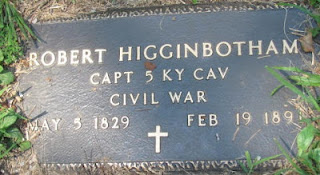During the Civil War, soldiers on both sides prayed for victory before each battle. Both presidents, Abraham Lincoln and Jefferson Davis, asked their supporters to pray for victories. The average citizen leaned on their faith to get them through the war. Religious people used their faith to get them through the war, and in the end it was their faith that helped them come to terms with the outcome and pretty much the whole entire meaning of the war. Each side in the war, as in any war, believed God was on THEIR side and in the end, said the outcome was simply God's will.
The 1st Kentucky Cavalry was organized at Liberty, Burkesville and Monticello, and mustered in for a three year enlistment on October 28, 1861, under the command of Colonel Frank Wolford of Liberty. The unit included 85 volunteers from my hometown of Albany. The unit was known as
The Wildcats after a battle on Wildcat Mountain near London, Kentucky. There were several brave and gallant men in the 1st Kentucky Calvary, but none were more dedicated to the troops of the First Kentucky Calvary than its Chaplin, W. H. Honnell of Harrodsburg.
At age 35, W.H. Honnell was a model clergyman, not that he preached much, or appeared sanctimonious, or intruded his religious notions upon any one, but because of his devotion to the sick and wounded. Not a soldier could be taken sick without his knowing it. He visited and conversed with all, ascertained their wants, and had them supplied if it was possible. Nor was this conduct occasional, it was continual and unceasing. His name was blessed a thousand times by sick and helpless soldiers. When any died, he was foremost in providing them a decent and Christian burial. He was not only kind and tender to the sick and wounded, but treated every one with gentleness and respect. Further, he was no coward. He delighted to be upon the battlefield, encouraging the soldiers by his presence, waiting upon and caring for the wounded, and praying for the success of arms while the battle was in progress. When marching, he was always in front near his gallant Colonel, and when the conflict raged, he could be seen where the danger was greatest.
He was at the battle of Mill Springs, administering to the necessities of the disabled, and was near General Felix Zollicoffer when he fell. Dismounting from his horse, the chaplain lifted the General from out of the road, where excited combatants were dashing to and fro, and carried his dying form to a place where it would not be trampled beneath the horses' feet.
Chaplain Honnell was at the front during a fight at Lebanon, Tennessee. He became separated from his regiment, and rode into the rebel ranks, mistaking them for Union troops, where he was captured - sort of.
Colonel John Hunt Morgan: "You take a position yonder," directing him to the rear.
Honnell: "I desire to go to my own regiment."
Morgan: "I told you where to go."
Honnell: "I don't like to be treated in such a way. I am chaplain of the 1st Kentucky cavalry, and want to go to my regiment."
Morgan: "It is hard for you to understand that I am Colonel Morgan, and you are my prisoner. My men need your prayers as well as Wolford's."
Honnell saw the position he was in, and submitted quietly. When Morgan commenced his retreat, he took Honnell along with him. After traveling at a pretty rapid gait for some distance, and the Unionists getting pretty close to them, Morgan said, "Well, Chaplain, I suppose we will have to separate, but before going you must pray." About this time a squad of Union cavalry dashed up, and Morgan had to proceed without the Chaplain's prayer.
As the above story indicates, during the Civil War both sides believed that God was on their side.
After losing the second Battle of Bull Run, President Lincoln said,
"In great contests each party claims to act in accordance with the will of God. Both may be, and one must be, wrong. God can not be for and against the same thing at the same time. In the present civil war it is quite possible that God's purpose is something different from the purpose of either party."
During his second inaugural address on March 5, 1865, he said
"Neither party expected for the war the magnitude or the duration which it has already attained. Each looked for an easier triumph. Both read the same Bible and pray to the same God, and each invokes His aid against the other."
So how could God be on BOTH sides?
President Lincoln re-framed the question and offered a startling conclusion: Neither side could claim God’s special favor. "The prayers of both could not be answered. That of neither has been answered fully. The Almighty has His own purposes."
President George W. Bush once said,
"Faith teaches us to respect those with whom we disagree. It teaches us to tolerate one another. And it teaches us that the proper way to treat human beings created in the divine image is with civility. Yet, you also know that civility does not require us to abandon deeply held beliefs. Civility and firm resolve can live easily with one another."
When we have deeply held beliefs, like most do, it is tempting to believe God is only on our side. But, there is a chance that He may very well be on their side, too!
So, then what?
Like it or not, the fact is God's offer of mercy is for ALL people.
I exhort therefore, that, first of all, supplications, prayers, intercessions, and giving of thanks, be made for all men; For kings, and for all that are in authority; that we may lead a quiet and peaceable life in all godliness and honesty. For this is good and acceptable in the sight of God our Saviour; Who will have all men to be saved, and to come unto the knowledge of the truth. 1 Timothy 2:1-4
So back to the question 'have you ever wondered which side the Lord is on?'
During the Civil War, President Lincoln overheard someone remark that he hoped the Lord was on the Union's side. Lincoln replied...
"I am not at all concerned about that, for I know that the Lord is always on the side of the right. But it is my constant anxiety and prayer that I, and this nation, should be on the Lord's side."











































